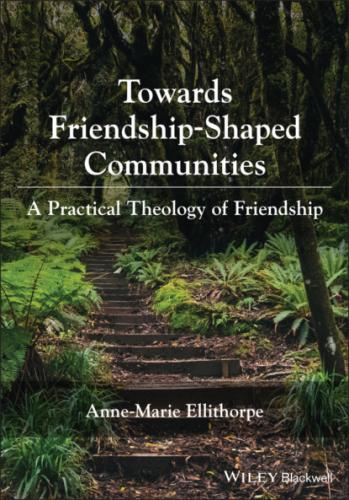In Friendship and the Moral Life, Catholic ethicist Paul Wadell also explores friendship as an analogy for relationship with God. Wadell identifies friendship as integral to the moral life and the development of virtue. “Friendship is the crucible of the moral life, the relationship in which we come to embody the good by sharing it with friends who also delight in the good.”81 A subsequent book explores the relationship between worship, justice, and Christian friendship.82 As Tobias Winright asserts, in a tribute to this author and his work, Wadell promotes an ethics of koinonia, and thus of friendship, for theology, the church, and beyond.83
Theological perspectives on friendship with the potential to enrich theological and social imaginaries continue to emerge in the early twenty-first century, briefly summarized as follows. Paul O’Callaghan, an Orthodox priest, presents a vision of friendship as revealing the communion of the Holy Trinity in The Feast of Friendship. For O’Callaghan, Christian friendship can be iconic, allowing a glimpse into divine and human reality.84 The love of friendship emerges as a necessary model of love within the Christian tradition in Liz Carmichael’s Friendship: Interpreting Christian Love. The need for the church to rediscover its nature as a relational and hospitable community on behalf of the world is expressed in a variety of works, including writings by Elisabeth Moltmann-Wendel, Steve Summers, John of Taizé, and Wesley Hill.85 Practical theologian Chloe Lynch explores ecclesial leadership as friendship, in her book by that name.86 Priest-scholar Victor Lee Austin identifies friendship as at the heart of being human.87 In Politics in Friendship: A Theological Account, Christian ethicist Guido de Graaff considers the intertwining of theology, politics, and friendship, framed around a story of friendship between Bishop George Bell and German theologian Dietrich Bonhoeffer.88
Acknowledging that many contemporary people of faith are more familiar with the language of discipline than of virtue, sociologist and spiritual director Susan Phillips encourages the cultivation of friendship as a spiritual discipline in The Cultivated Life.89 Phillips uses the imagery of soul gardening, suggesting that relational gardens need to be kept in good repair.90 Friendship is identified as an heirloom plant that is precious and requires tending, yet is often overlooked.91
In the writings of Australian theologian-activist Charles Ringma, friendships are gifts that require nurture and must be shared.92 Readers are warned not to make friendship exclusive: clinging to this fragile gift can deter the practices of hospitality and solidarity and “the politics of radical openness to the other.”93 Contemplation, through attentiveness to God, self, and ultimately others, is recognized as integral to the nurturing of friendship and community, allowing us to see and hear what may otherwise elude us.94
While, as we will see, biblical and medieval writers have spoken of friendship with God, current authors writing from a Christian perspective are divided on this issue. For some, friendship with God is unthinkable. To speak of friendship with God is to trivialize or sentimentalize relationship with God. For others, the possibility of friendship with God is exclusively for those saints who have been formally acknowledged as holy or virtuous. Yet others have become convinced that friendship is an appropriate analogy for the relationship God desires with human beings. Carmichael, for example, concludes, “God reveals what friendship is.”95 Nevertheless, concern is expressed that friendship with God implies a comfortable, casual, kitschy, or sentimental relationship. The possibility of friendship with God will be further explored in subsequent chapters.
Is Friendship a Private, Public, or Political Relationship?
Is friendship simply a private, recreational relationship based on sentimental attachments, as currently portrayed, or is it relevant to communities, to politics, and to the common good?96 Relatively little attention has been paid to the relationship between friendship and community. While friendship is relevant to the church, to monastic and apostolic communities, and to various other communities of faith, as well as to the broader community, it is not unusual for friendship to be ignored, devalued, or discouraged within many of these communities of practice.
Contemporary Euro-Western societies have privatized friendship. Moltmann encourages Christians to reverse this trend, de-privatizing friendship as they rediscover its public character, and living out this friendship as a “fellowship of friends who live in the friendship of Jesus.”97 Friendship is spread in society as friends of Jesus encounter the forsaken and despised with affection and respect.98 We may add that the despised and oppressed engaging in nonviolent resistance to oppression also contributes to the spread of various forms of friendship.
Friendship can and has served as a hiding place from politics. Yet in a variety of contexts and countries the power of friendship (in its various dimensions) to transform politics has become evident. Within struggles for social change and justice, and against various forms of oppression, friendship has been recognized as a model for a new kind of world and a way of bringing a new kind of world about.99 Friendship has both generated and been an outcome of such solidarity.
Friendship was central to the twentieth century civil rights movement within the United States. For Martin Luther King Jr., the goal of nonviolent activism was ultimately to win the understanding and friendship of opponents.100 Here it is worth noting that King drew significantly on Nygren’s work on agapē, critiqued above, to advocate for nonviolent resistance that intentionally seeks the good of white oppressors. He did not, however, follow Nygren’s emphasis on love as uncalculating and unmotivated.101 Rather, King’s developed definition of love “combines dimensions of equal regard, mutual love, and delivering love, in addition to echoes of Nygren’s sacrificial love.”102
